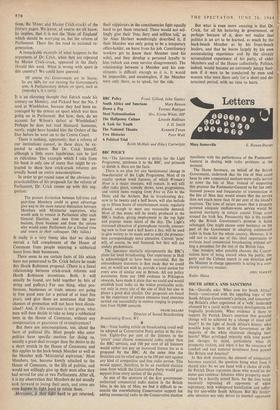BBC POLICY
SIR,—The Spectator invents a policy for the Light Programme, attributes it to the BBC, and proceeds to deride it. Here are the facts.
There is no plan for any fundamental change in thascharacter of the Light Programme. Most of its regular spoken word features, of which Woman's Hour is a major example, will remain. It will still offer radio plays, comedy shows, news programmes, and varied items ranging from Five to Ten to the Dales and the Archers. But its broadcasting day, now to be twenty and a half hours, will also include up to fifteen hours of entertainment music, regularly placed, enough to meet any reasonable demand. Most of this music will be newly produced in the BBC's studios, giving employment to the top light and popular music talent of the day. The Light's increased allocation of gramophone records, amount- ing now to four and a half hours a day, will be used to give variety to its music and to make the presenta- tion correspondingly more attractive. Current `pops' will, of course, be well featured, but they will not unduly predominate.
The Spectator similarly misrepresents the BBC's plans for local broadcasting. Our experiment in Hull is acknowledged to have been successful. But the extraordinary statement is then made that we could not, or would not wish to, provide a local station for every area of similar size in Britain. All our policy statements, from our 1960 evidence to Pilkington onwards, have made it plain that we could and would establish local radio on the widest practicable scale, not only in every city of the size of Hull but also in places a good deal smaller. Our proposals are based on the experience of sixteen extensive local exercises carried out successfully in centres ranging in popula- tion from 50,000 upwards.
FRANK GILLARD Director of Sound Broadcasting Broadcasting House, WI


































 Previous page
Previous page